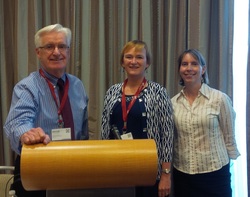
There were 700 participants, and about 200 of those were patients.
One of the key themes was the value of patient storytelling. To illustrate the power of such an approach, two of the plenary speakers were mothers who had lost or damaged children due to medical error. A baby died after a well-meaning nurse turned off the baby’s heart monitor, wanting the exhausted mother at his hospital bedside to get some sleep – the alarm manufacturer did not build a failsafe into the system. Another baby suffered significant brain damage when his jaundice went unchecked, when an easy blood test would have revealed his risk. Both these mothers rose above their grief to become highly, powerfully active advocates for patient safety, championing initiatives that have saved the lives and health of many babies since. So I am not alone in being the harmed patient who throws herself into system reform.
The Cancer Olympics is my story about the injured turned advocate. Every day, I receive an email from someone who has read it. Like me in that audience listening to those mothers, my readers respond to the medical error aspects of the book with fear and outrage. Many write with similar stories to mine, having lost loved ones to bungled or superficial medical care. And many take heart that change is possible, that the cracks through which we can fall through medically can be closed by careful consideration, and that our stories are not told in vain.
I attended a presentation on how trained observers can help guide doctors to higher quality communication with patients (teaching them such skills as eye contact and head nodding – imagine!). After it was over I was suddenly overcome by inexpressible sadness. I wandered outside as if dazed. Why was I so triggered by that topic? Self-reflection led me to my memories of Doctor Two in my story. I had known her as a doctor and a colleague for 15 years. I respected her so much. Could I ever have foreseen what she would do, or not do, in my case? All at once I was blindsided by a feeling of great sorrow for her, and for myself. A rare moment in which the hurt underneath my bravado hit with full force. Regaining my self-possession, because I had to present that afternoon, I was nevertheless haunted by those feelings: if only, if only, if only.
But that is where books like The Cancer Olympics can help us. I hope it helps us. I hope it leads doctors to better communication, and patients towards greater vigilance. It is getting great reviews: see this one from Nova Scotia’s Chronicle Herald: http://bit.ly/X6OR3a. Reviewers on Amazon and Chapters are hailing it as a “riveting riveting read.” I want the story out there not just because it raises money for cancer charity and research, but because it can empower. Empower individuals, and empower system change. Someone, someday, will be a safer patient because of it.
 RSS Feed
RSS Feed